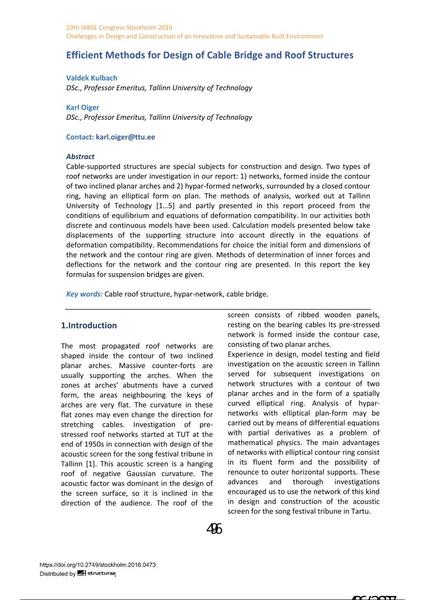Efficient Methods for Design of Cable Bridge and Roof Structures

|
|
|||||||||||
Détails bibliographiques
| Auteur(s): |
Valdek Kulbach
(DSc., Professor Emeritus, Tallinn University of Technology)
Karl Öiger (DSc., Professor Emeritus, Tallinn University of Technology) |
||||
|---|---|---|---|---|---|
| Médium: | papier de conférence | ||||
| Langue(s): | anglais | ||||
| Conférence: | IABSE Congress: Challenges in Design and Construction of an Innovative and Sustainable Built Environment, Stockholm, Sweden, 21-23 September 2016 | ||||
| Publié dans: | IABSE Congress Stockholm, 2016 | ||||
|
|||||
| Page(s): | 496-504 | ||||
| Nombre total de pages (du PDF): | 9 | ||||
| Année: | 2016 | ||||
| DOI: | 10.2749/stockholm.2016.0473 | ||||
| Abstrait: |
Cable-supported structures are special subjects for construction and design. Two types of roof networks are under investigation in our report: 1) networks, formed inside the contour of two inclined planar arches and 2) hypar-formed networks, surrounded by a closed contour ring, having an elliptical form on plan. The methods of analysis, worked out at Tallinn University of Technology [1…5] and partly presented in this report proceed from the conditions of equilibrium and equations of deformation compatibility. In our activities both discrete and continuous models have been used. Calculation models presented below take displacements of the supporting structure into account directly in the equations of deformation compatibility. Recommendations for choice the initial form and dimensions of the network and the contour ring are given. Methods of determination of inner forces and deflections for the network and the contour ring are presented. In this report the key formulas for suspension bridges are given. |
||||
